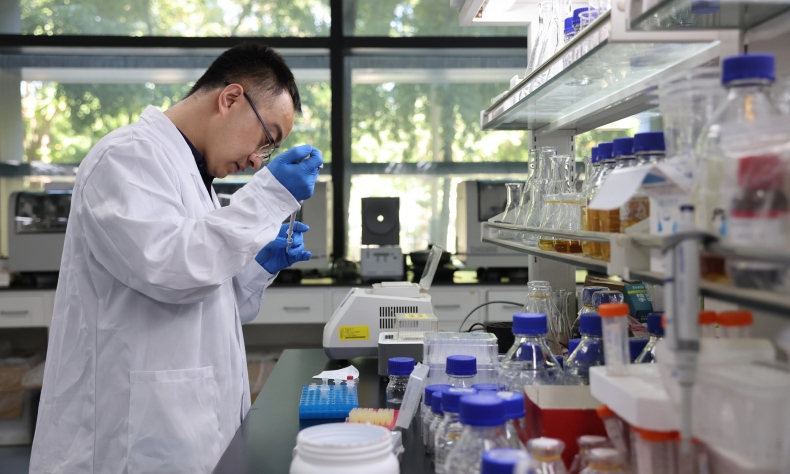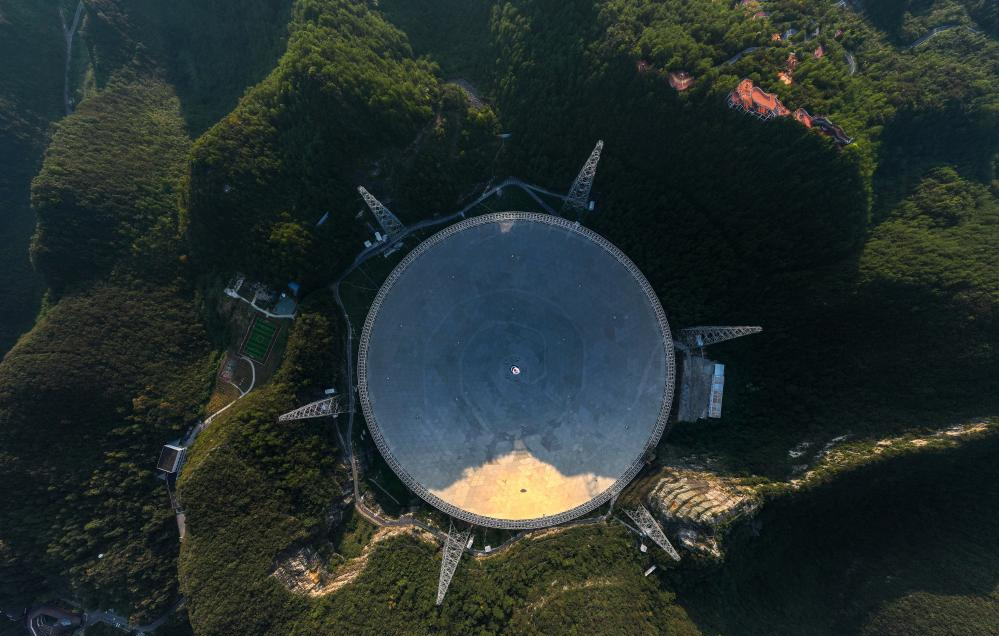Scouting for Talents

As China increases its efforts to build world hubs for talents and innovation, the country’s thirst for more talents from across the world is increasing, so are the moves to attract them.
Countries are competing to attract talents – as seen in the U.K.’s launching the Global Talent Visa and Singapore announcing the Tech@SG Programme. With a population of over 1.4 billion, China is also eager to attract talents, having a long tradition of valuing talents, as reflected in the Chinese idiom “Seek talents as if you are thirsty.” In recent years, Chinese President Xi Jinping has frequently emphasized the topic of talent, with three points standing out: the spirit of scientists, a favorable environment for talents, and promoting related international exchange and cooperation.
The spirit of scientists
The development of every country relies on scientific and technological innovation, while the advancement of scientific and technological innovation is dependent on talents. In his report to the 20th National Congress of the Communist Party of China (CPC), President Xi called for relying on talents to pioneer and propel development. He said, “We must regard science and technology as our primary productive force, talent as our primary resource, and innovation as our primary driver of growth.”
Over the past years, China has made a lot of technological achievements, including sending the deep-sea manned submersible Fendouzhe (Striver) to a depth of over 10,000 meters in the ocean and launching the world’s first 6G satellite into outer space. What enabled those achievements was the tireless efforts of numerous scientific talents working day in and day out, demonstrating their dedication to science and the country’s development.
Take for example Nan Rendong, the chief scientist of China’s Five-hundred-meter Aperture Spherical Radio Telescope (FAST), the largest radio telescope in the world. It took Nan and his team 22 years of hard work and countless failures to finally create what they did. At one point during their research, he could communicate with his team only through e-mail as he was recovering from surgery for lung cancer. During his recovery, he still chose to continue his work at the FAST site despite the pain.
In an interview, Nan once told reporters, “Looking back over our experience, we’ve seen both hardships and joys. When you face setbacks, you obviously feel particularly frustrated and troubled. But what can you do? In the end, it was through everyone’s joint efforts that we overcame difficulties and pushed forward. FAST is the result of the hard work of a large group of people, not just my efforts alone. We can even say it is the effort of a whole generation…If there was even a slight flaw in the FAST, we would have let the country down.”
Nan’s action of putting his money where his mouth is denotes the spirit of patriotism, selflessness, and devotion to his country as a Chinese scientist. He died on September 15, 2017, 10 days before the anniversary of FAST. In September 2019, President Xi signed a presidential decree, conferring the honorary title “Scientist of the People” on him.
In May 2019, the CPC Central Committee and the State Council issued a document, Opinions Concerning Further Carrying Forward the Spirit of Scientists and Improving Work Style and Learning Style, which summarized the spirit of scientists as exhibiting the following characteristics: the patriotic spirit of dedication to their motherland and serving the people, the innovative spirit of reaching for new heights and daring to be the first, the realistic spirit of pursuing truth and rigorous scholarship, the selfless spirit of being indifferent to fame and wealth and diligently yet quietly pursuing research, the cooperative spirit of conducting collective problem-solving and teamwork, and the educational spirit of nurturing and supporting the next generation.
In February 2021, Xi visited Guizhou Province where he called on science and technology professionals to follow in the footsteps of outstanding scientists like Nan Rendong. Many other Chinese scientists like Nobel laureate Tu Youyou have also become trailblazers in their respective fields by making great breakthroughs in the face of major difficulties.

On September 11, 2020, President Xi acknowledged at a symposium attended by scientists that China’s historic scientific and technological achievements are the result of the dedicated service, constant advancement, and continuous struggle of generations of scientists. He said, “Scientific achievements cannot be separated from spiritual support. The spirit of scientists is a valuable spiritual asset that has been accumulated by scientific workers through a long period of scientific practice.”
Xi reiterated again in September 2021 at a central conference on talent-related work the significance of promoting the spirit of scientists, saying it provides spiritual guidance and an ideological guarantee for talent-related work.
More recently on June 24, 2024, while speaking at a meeting conflating the national sci-tech conference, the national science and technology award conference, and the general assemblies of the members of the Chinese Academy of Sciences and the Chinese Academy of Engineering, he urged the listeners to foster a social atmosphere that respects labor, knowledge, talent, and creativity, and vigorously promote the spirit of scientists. He also encouraged scientific researchers to set lofty goals, dedicate themselves to the nation, and remain committed to innovation.
A favorable environment
A favorable environment nurtures great talents just like a fertile land promises bumper crops. During his inspection trip to Wuhan on June 28, 2022, Xi said, “The CPC Central Committee deeply cares about the growth of scientific and technological talents. Party committees and governments at all levels should thus strive to create favorable systems, mechanisms, and working and living environments that support scientific and technological innovation, which allow them to make greater contributions to the country and its people.”
For instance, at the national level, China has established a series of awards to recognize the contributions of outstanding scientists. They include the State Preeminent Science and Technology Award, the country’s top sci-tech award, the State Natural Science Award, the State Technological Invention Award, the State Scientific and Technological Progress Award, and the International Science and Technology Cooperation Award.
On June 24, 2024, President Xi presented the national top sci-tech award for the year 2023 to Li Deren, a trailblazer in China’s remote sensing technology, and Xue Qikun, a prominent scientist in the field of condensed matter physics. He called for the improvement of incentive systems such as science and technology awards, income distribution, and proprietorship of achievements so that more outstanding talents receive fair rewards and their creativity is unleashed.
Local governments have also implemented various measures to foster a favorable environment for talents, such as offering rent and subsidies to newly graduated students to help them settle down.
In February 2023, China launched a “talent visa” for six categories of talents, namely outstanding, scientific research, education, healthcare, legal, and other talents, from mainland cities located in the Guangdong-Hong Kong-Macao Greater Bay Area, allowing them to stay as long as 30 days in Hong Kong and Macao. This April, China’s National Immigration Administration announced that the “talent visa” would include Beijing and Shanghai into the policy, further facilitating the flow and exchange of talents across the region.

On July 11, 2024, Beijing rolled out an implementation plan (2024-2026) for accelerating digital talent development to support the growth of the digital economy. The plan introduces 16 measures aimed at cultivating four types of digital talents over approximately three years, increasing the supply of digital talents while at the same time fostering a concentration of digital talents.
Efforts like these have made China an ideal place for cultivating talents. According to the Global Talent Competitiveness Index (GTCI) 2023 released by INSEAD, China ranks 40th in the top-performing upper-middle-income countries in the GTCI. The report also pointed out that over the past decade, China has moved from being a mover of talents to a champion of talents.
International exchanges
At the beginning of the 20th century, many CPC leaders went to study in European countries. For example, Zhou Enlai, the first premier of the New China, and Deng Xiaoping, the chief architect of China’s reform and opening-up drive, both studied in France. Their overseas experience provided them the opportunity to come in contact with new ideas and perspectives from the West and better understand China and the rest of the world in that turbulent time. This in turn later helped them promote China’s own development.
In his speech at the centenary celebration of the Western Returned Scholars Association on October 21, 2013, Xi displayed an open attitude to attracting talents, saying, “A developing China needs more overseas talents, and an open China welcomes outstanding talents from all over the world.” In his congratulatory letter to the 110th anniversary of the association in 2023, he called on it to rally talents from around the world and pool strengths of creativity for the development of the Party and the country.
To achieve this, more platforms like the China-Europe Talent Forum (CETF) are being built to facilitate talent exchange with other countries. Launched in 2018, the CETF has been held five times and the 2024 forum will be held this October. In April 2019, Xi reached a consensus with the then- president of the Swiss Confederation Ueli Maurer to continue hosting the CETF and promote talent exchange between the two countries.
In addition to this, China has encouraged educational cooperation with other countries to jointly cultivate talents. In May 2006, China’s Wenzhou University and Kean University of the United States formally signed an agreement to jointly establish the Wenzhou-Kean University. It was officially established in 2014 and became a landmark project in China-U.S. educational cooperation. As of this June, it had about 4,500 students across undergraduate, masters, and doctoral programs, and over 3,300 students have earned their undergraduate degrees in the past eight years.
Since talents come from different countries representing diverse cultural backgrounds, strengthening talent exchange not only improves a country’s competitiveness and national strength, but also enhances mutual understanding. In a recent letter to Lamont Repollet, president of Kean University, Xi encouraged universities in China and the United States to strengthen exchanges and cooperation to contribute to the China-U.S. friendship. He said, “China and the United States should strengthen exchanges and cooperation through various forms, and cultivate young envoys who know both countries well, thereby building more bridges to promote China-U.S. friendship.”
According to the Global Innovation Index 2024 released by the World Intellectual Property Organization this August, China’s leading the world with 26 science and technology clusters of the top 100 reflects the country’s rapid growth in innovation output. As China increases its efforts to build world hubs for talents and innovation, the country’s thirst for more talents from across the world is increasing, so are the moves to attract them.
 Facebook
Facebook
 Twitter
Twitter
 Linkedin
Linkedin
 Google +
Google +










